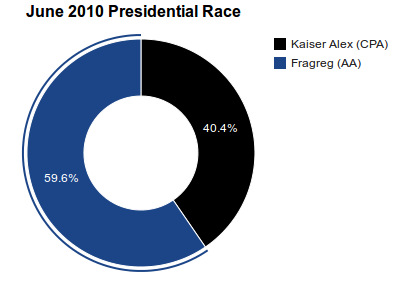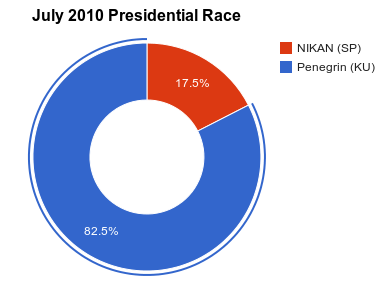[MoE] Political History: The Alliance Era (I)
 •
by
•
by BundesPresseDienst

This is a continuation of a series of articles detailing the political history of eAustria, with this entry beginning in June 2010. This article details the first part of what we are calling the “Alliance Era” - a time where the political alliance of the Kronloyale Union and Adeptus Austria took the front seat in navigating Austria into an uncertain future.
Previous entries:
The One Party Era (April 2009 - August 2009)
The Competitive Era Part I (September 2009 - November 2010)
The Competitive Era Part II (December 2009 - February 2010)
The Croatian War Era Part I (February 2010 - April 2010)
The Croatian War Era Part II (May 2010)

Alliance Era (June 2010 - November 2010)
Presidents: Fragreg - Penegrin - Thomas765 - Kikericsy - Penegrin - NIKAN
Defining political battles: Conservatives vs Nationalists, KU vs OIP
Defining Issue: Foreign policy
Defining traits: Powerful presidency, weakened cabinet; more influential congress
With the Croatian PTO having subsided, and the strategic situation in central Europe now favoring Phoenix and Austria, the central challenges of the previous era had ended. After months of uniting together, now Austria would enter a time where political competition again took the forefront in an era of relative peace. The Kronloyale Union and Adeptus Austria would form new a dominant political alliance during this era, which would set the tone and drive political debate.




Nationalism vs. Conservatism
The last time there was open political competition, the conservative KU and nationalist NFA had formed a powerful political alliance that swept Borojevic von Bonjar into office in February. Since then, the NFA had dissolved, with the formation of the CPA (Kaiser Alex) and ASO (PrinceOfAustria) as its successors. While the KU remained under Borojevic von Bonjar’s leadership, the nationalist parties had drifted away from their previous alliance with the KU during the Croatian War era, wanting to pursue their own path together. With the June 2010 Presidential election approaching, and the incumbent president (Rangeley) not running for re-election, it was an open field. CPA’s party president, Kaiser Alex entered the race.
After the success of the previous month, this new nationalist alliance (CPA + ASO) wanted to press its advantage: they advocated expansionism into a neighboring country, and potentially supported joining an alliance to make it happen. To them, the Austria had been the clear victor in the previous engagement, and provided an opportunity to become more assertive as a nation.
But another political alliance would form, between the conservative KU and the like-minded Adeptus Austria, led by Fragreg. They would put forward Fragreg as a candidate for president. While viewing the events of May as a success, they took a much more “realist” foreign policy view. In their view, Austria had not won because it possessed great military power; the military successes came from close cooperation with allies, and in some cases, through sheer luck. Placing Austria in a more solid position - solidifying the new peace - would not be achieved by launching a war of expansion, but by increasing the cooperation with allies: taking decisive action.
The AA and KU placed forward Fragreg as their presidential candidate, earning the support of the OIP, which largely agreed with their interpretation of the events - but strongly disagreed with the platform of the nationalist coalition. As a party formed in opposition to expansion, it found both realist, and more ideological objections to the plan to change to aggressors.
Accusations and Backtracking
With the race now looking to be in Fragreg’s favor, Kaiser Alex issued a new dramatic strategy, claiming that Fragreg was a PTOer who meant the country harm. The strategy - which was surely intended to win favor for Kaiser Alex - backfire
😛Fragreg was a highly respected, and trusted member of the Austrian community who had been serving as Minister of Finance for the past month, and assisting the country long before. With nothing to back the claims, the reaction was immediate - the ASO began to speak publicly of removing their endorsement of Kaiser Alex.
Realizing that he had overplayed his hand, he backtracked his allegations of being PTO, saying “maybe” they were too aggressive. While the ASO would maintain their endorsement, the overall strategy would not change minds in his favor. In the June 2010 election, Fragreg came out ahead 59.56% to Kaiser Alex's 40.44%.

Rhone Alps
Fragreg had demonstrated during the war his extensive knowledge of the game, and his term would again see this put into action. With a diverse cabinet, his term would see further organization of the military, and expansion of the Ministry of Welfare under Penegrin. There was also an expansion of the Ministry of Community that began in March - polls and interviews were conducted through the Bundespressedienst on a regular basis.
He also lived up to the pledge to take decisive action. Carrying out a strategic swap with Hungary, the resource rich region of Rhone Alps region France was freed from Spanish occupation (Spain had not yet been fully pushed out of France from the earlier war). The action in favor of France was a military success, which gained support from the KU, AA, ASO, and OIP as well. However, it would receive much criticism from the CPA.
Of the two nationalist parties (ASO and CPA), the CPA was easily the more extreme of the two, with some members extremely opposed to Fragreg and the government. This opposition in some ways would push the ASO out of their sphere. The Rhone Alps action was popular with the ASO - and the CPA fears that Austria would not regain regions after the swap proved unfounded. Instead, they would move into the KU’s sphere, as they were in search of a party with a more like-minded mission.
Penegrin, the KU’s new leader, was able to bring them on board, gaining their endorsement for his presidential candidacy in July. The CPA would not field a candidate in opposition: if their missteps at the start of July marked the start of their downturn, the success of the Rhone Alps mission marked their death knell as a major political player in Austria, as nationalist support solidified behind the more moderate ASO.
Instead, the newly re-formed Socialist Party would displace the CPA in the top 5, fielding NIKAN as their candidate. NIKAN had been involved with the PTO, but like Djani before him presented himself as repentant and wanting forgiveness. Few would take this seriously: with the backing of the KU, AA, OIP, and ASO, Penegrin would have a decisive victory, winning 82.52% over NIKAN's 17.48%.

V2 eRepublik
Penegrin would be the second real-life Austrian elected president - and after serving in multiple governments, and in particular working closely with Fragreg, brought great experience to the role. July would see the first full month of “V2 eRepublik” - a period of the game where there were many changes to how the game worked in all aspects. The government made a priority to try and provide economic stability, as ironically much of the ground gained since the end of the Croatian war in the job market and general economy was lost with the new system. OEBernd lead the effort as the new Minister of Welfare.
Working closely with Phoenix, all Austrian regions were fully returned, for the first time since the war with Croatia. These RW’s, combined with training wars, provided a learning experience for the new military system: grid based battles replaced the old “wall” style, introducing a huge new opportunity for strategy. The first real test came with a successful Austrian deployment in favor of a Bolivian (pro-Phoenix) independence effort, while another closer to home saw deployment in favor of Hungary against EDEN.
Overall, the transition to V2 was a surprisingly successful time for Austria: seemingly for once, changes actually benefited the nations position. Fragreg would continue as Minister of Finance, and greatly increase the reserves of the Austrian Central Bank during this time. This period of time saw a large focus on the past history of Austria, as the government sought to compile some of it for the eRepublik wiki, and Penegrin’s frequent updates (in the form of "A Mesage From the President") proved popular. However, he would not choose to run for re-election - opening the field to new candidates.
Thomas765, the new leader of the OIP, placed himself forward for candidacy in August, and quickly gained the support of all major parties in Austria. More conservative than the previous OIP leader Rangeley, he was well positioned to appeal to the conservative leaning alliance of the KU and AA, as well as the ASO. In the end, he would run unopposed, and largely continued the policies of the previous two months.

Italian Invasion
The peace in Austria since Croatia and Poland were repelled in May would find its first test in August. Italy, previously a member of Entente, withdrew from the alliance in July over disputes with France. Seeking the favor of EDEN, they launched an attack against Austria in Salzburg on August 24th - on their way to attacking Germany. Now, Austria would have a chance to test its skill on the new grid-based battle system.
At first, Italy quickly overtook the entire map: Austria put forward only limited resistance to the much larger force. Italy was highly prepared and occupied the key strategic points with heavy stacks of troops. However, the Austrian counter-attack was in the works. Led by Fragreg, whose Omnicorp militia were joined by Hungarian and Ukrainian fighters, as well as the Bundesheer, led a coordinated attack against the stacks of Italian troops.
Although far outnumbered, Italy’s early coordination would not continue into the later hours of the battle: their troops largely sat idle as the counterattack overpowered them. Austria and its allied help completely pushed back the Italian force and successfully defended Salzburg.
Tyrol
After the success in battle, it was agreed not to push the advantage - even as Italy taunted for a counterattack - which would have triggered MPP’s against Austria. Instead, Minister of Foreign Affairs Rangeley made a diplomatic push to de-escalate the situation, and to secure peace with Italy, meeting their Minister of Foreign Affairs Scoundrel, offering forgiveness for their attack and promising to turn the page on relations.
The offer was rejected - and Italy launched its second attack, now into Tyrol on September 3rd. Even larger than before, again the battlefield was overwhelmed by Italy’s numbers. But yet again, Fragreg was able to lead a highly successful counter-offensive, dramatically retaking the map against an unorganized Italian occupation force. This battle saw the heaviest fighting Austria would ever see in the new V2 system - and its success forced Italy to reconsider Austria’s peace proposal, which remained on the table. A tenuous peace was accepted between the two parties - and Scoundrel, Italy’s MoFA, would become Italy’s new president, a seeming assurance that the agreement would be upheld.




A Looming Battle
While Thomas765 had gone into office with the backing of all major parties, there was a key disagreement that was looming. Should Austria try to join Phoenix? While all major parties were pro-Phoenix, the liberal OIP and nationalist ASO favored remaining officially outside it, while maintaining close ties with its member nations. The conservative AA and KU however favored joining it outright - believing that it was necessary towards securing a longstanding security. This battle would see its first act play out in the September 2010 presidential election, between the ASO’s samu-L and the AA’s Kikericsy.
Next: Alliance Era (continued)


Comments
[removed]
All hail glorious Penegrin! o/
Who is this Penegrin? You seem like a neutral, uninvolved person to ask.
I am glad you ask. He was the glorious leader of a glorious country during a glorious age. If I had to describe him with one word it would be...'humble'.
I remember liking V2 and being disappointed with the changes the admins made to simplify the game again. I wish they had kept more complexity.
Also, I thought Fragreg & Penegrin were evil oppressors too at first, but luckily this wasn't the case 😃
Or was it...? 😆
That's when I was a citizen of Austria 🙂
Fragreg, Kikericsy \o/
\o/
A sto me zabole.